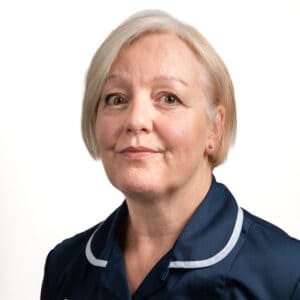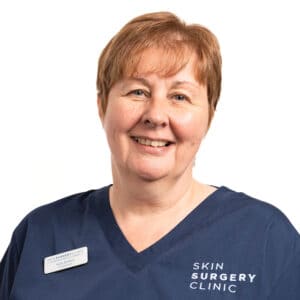Private Skin Cancer Treatment At A Glance
Time
30-75 minutes
Price
from £595 and £195 consultation
Treatment
Surgical excision procedure
Recovery
2-4 weeks
Do
Keep dry (7 days), attend review appt
Don't
Remove dressings, exercise (2-4wks)
Private Skin Cancer Treatment in Newcastle
The NHS generally offers a rapid diagnosis of skin cancer but patients are increasingly finding that the waiting list for treatment can be quite lengthy.
In particular, patients waiting for basal cell carcinoma removal (often shortened to "BCC removal") or rodent ulcers, can wait for several months or longer to be operated on.
Once patients know that they have skin cancer, many want to have the lesion removed immediately.
We are delighted to be able to offer this treatment with no waiting list to patients in our clinic in Gateshead Team Valley, easily accessible from Newcastle, Sunderland, Whitley Bay, Tynemouth, Blyth, Consett, Chester-le-Street, South Shields and North Shields.

Who is private skin cancer treatment for?
At Skin Surgery Clinic we offer a private skin cancer treatment service for patients who would like:
- to explore a faster option than the NHS
- to be diagnosed, treated and reviewed privately.
If you have a mole or lesion that you are worried about, it is important that it is checked by a medical professional as soon as possible.
Our service on Tyneside is consultant-led by Mr David Sainsbury. Our team of Consultant Plastic Surgeons and Consultant Dermatologists each work within their own NHS hospital's skin cancer service as well as seeing patients at our clinic.
Read on for more information about how we diagnose and treat skin cancer, and your options both at Skin Surgery Clinic and within the NHS.
Surgical Facilities at our Clinic
Our skin cancer treatment services are carried out in our Minor Ops Suites. We are located in Gateshead Team Valley, convenient for Newcastle and the surrounding area. Our clinic is monitored and regulated by the Care Quality Commission, allowing our Consultants to provide the highest level of care, as you would expect from a private clinic or hospital.
Jump to:
Understanding the 3 Primary Skin Cancers
In this video, Mr Tom Collin explains the three main types of skin cancer: Basal Cell Carcinoma (BCC), Squamous Cell Carcinoma (SCC), and Melanoma.

Skin Cancer Surgery Videos
See Basal Cell Carcinomas removed at Skin Surgery Clinic by Consultant Plastic Surgeons Mr David Watt and Mr Andrew WIlliams.
Note: For patients who would like to know what takes place during treatment, these videos show the surgical procedures in full detail.
Private Skin Cancer Treatment Newcastle Treatment prices
All procedures are carried out by a Consultant Plastic Surgeon.
| Consultation | £195 |
| Excision, Histology & Review Appointment | from £595 |
| Excision with Skin Graft, Histology & Review Appointment | from £995 |
| Histology | from £125 |
Who carries out Skin Cancer Treatment in Newcastle?
Working Alongside the NHS
All our plastic surgeons are members of their local NHS hospital skin cancer multidisciplinary team (MDT) and attend weekly MDT meetings. All potentially complex cases of skin cancer are discussed at these meetings and a treatment plan is formulated.
Types of Skin Cancer
There are a range of names you may hear or read when learning about skin cancer. Skin cancers fall into two main types:
Non-Melanoma Skin Cancers
This type includes:
- Basal Cell Carcinoma (BCC) or Rodent Ulcer
- Squamous Cell Carcinoma (SCC)
Basal cell carcinomas are the most common type of skin cancer. The cancer very rarely spreads beyond the skin. Normally it is curable with a small surgical procedure.
They can have a variety of appearances. They may bleed when rubbed with a towel and sometimes heal over before returning every few months. They normally grow slowly.
Squamous cell carcinomas are another fairly common type of skin cancer, which do occasionally spread beyond the skin. Again, they are normally curable with a small surgical procedure. Like BCCs, SCCs also have a range of appearances. They can have a hard, horn-like surface and sometimes grow rapidly.
Melanoma Skin Cancers
This group includes:
- Malignant Melanoma
- Superficial Spreading Melanoma
- Nodular Melanoma
- Lentigo Maligna Melanoma
- Acral Lentiginous Melanoma
Melanoma is less common than non-melanoma skin cancers, but is potentially more serious. This is because it can spread away from the skin to other sites in the body. Fortunately the vast majority of melanomas are curable with a small surgical procedure if caught early.
Melanomas are often, but not always, pigmented (brown and/or black). They are often larger and more irregular in shape and colour than a normal brown mole.
How can I access private treatment?
Diagnosis
Our service begins with diagnosis. You will be seen by a doctor who is an expert in skin cancer, either a dermatologist or plastic surgeon. The doctor will examine the area of concern and this may be sufficient to establish a benign (non-cancer) diagnosis or identify a potential skin cancer.
A small surgical procedure to take a sample (biopsy) may be recommended. This sample will be sent to an NHS laboratory for analysis. It may take the lab two or three weeks to process your sample and report the findings back to us.
We will arrange either a face-to-face or telephone consultation with you to discuss your results, and give you advice on next steps. These could include treatment at our clinic, or referral back to the NHS. We'll also send a letter to your GP.
Treatment
If you have a non-melanoma skin cancer, in 95% of cases a surgical removal of the BCC or SCC will cure it. These are usually small excisions, removing only a few millimetres of normal skin around the cancer. After removing the cancer, your surgeon will either stitch the wound or use a skin flap or skin graft to reconstruct it.
If you have a melanoma skin cancer and it has been caught early, we may be able to remove it at our clinic. The excision will be larger - removing about 1-2cm of normal skin. However, most melanomas will need to be treated in an NHS hospital.
Follow up appointments
Patients with basal cell carcinomas which have been completely removed with surgery do not require follow-up appointments.
Patients with small squamous cell carcinomas normally need a single follow-up appointment at six months. This is included in the cost of treatment. More advanced or complicated cases may need appointments every three to six months for two years and sometimes longer.
Patients with melanomas that are small and are caught early need a single follow-up appointment at six months. This is included in the cost of treatment. More complex or advanced cases (carried out in hospital) will need follow-up appointments every three to six months for five years.
Before and After
Basal Cell Carcinoma Removal - forehead









FAQs:
Do I need an NHS referral?
There is no need for a referral from your GP or hospital. Many patients will have been to their GP before they come to us, but we are able to consult with and treat patients without an NHS referral.
Skin Cancer Treatment involves histology of the lesion/s in question, which includes a report outlining the findings. Communication between the Clinic and the NHS is upheld rigorously and we will keep your GP informed of the outcome of any consultation procedure.
How can I be sure I am suitable for treatment?
If you would like to be sure that your skin is treatable at our clinic before attending your in-person Consultation, please complete a free online consultation. This doesn't replace the need for your face-to-face Consultation but does allow us to confirm that we can treat your condition here under local anaesthetic.
Make sure you tell us the size and location of your lesion(s).
Complete an Online Consultation
What if I already have a skin cancer diagnosis?
Some patients may have already received a diagnosis of basal cell carcinoma (BCC) from the NHS and face a lengthy wait for treatment. The wait is unlikely to cause significant harm but during a wait of many months the BCC will slowly increase in size. Understandably, some patients would rather explore the option of more rapid treatment outside of the NHS.
At Skin Surgery Clinic we aim to treat skin cancers within three weeks of the first appointment.
If your squamous cell carcinomas or melanoma treatment takes places within the NHS, this will usually happen within two months.
What are Skin Cancer Multidisciplinary Teams (MDTs)?
The MDT consists of dermatologists, plastic surgeons, specialist cancer nurses, pathologists (who examine the biopsies under the microscope), radiologists (if scans or x-rays are required) and oncologists (doctors who treat cancers with radiotherapy and chemotherapy).
If a patient with a melanoma or SCC is diagnosed at Skin Surgery Clinic then a discussion about the patient’s case would normally take place at the weekly NHS skin cancer MDT meeting in Newcastle or Durham/Darlington.
If, after excision at the Skin Surgery Clinic, further surgery is recommended by the MDT, then there would normally be no charge for any additional treatment.
The NHS skin cancer pathway
We do not currently see or treat NHS patients.
All skin cancers are eligible for treatment for free on the NHS. If you are concerned about a mole, you should make an appointment to see your GP.
Spots or lumps on the skin that may be a melanoma or squamous cell carcinoma are normally referred by a GP to a hospital specialist (dermatologist or plastic surgeon) to be seen within two weeks. If the diagnosis is confirmed, treatment should then take place within two months.
Basal cell carcinomas are not normally referred or treated within the two week / two month pathway as they are less likely to cause significant health problems. This is most commonly where patients seek private treatment instead.
Reviews
Patient feedback is collected through our reviews partner, Feefo.











